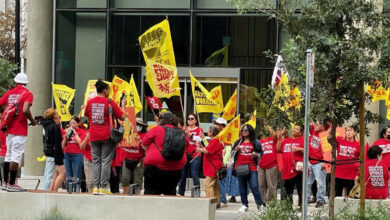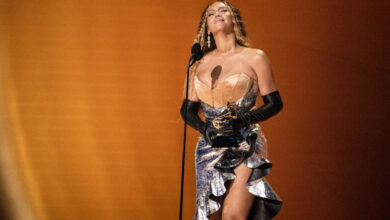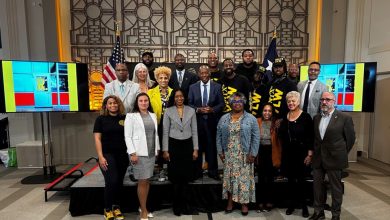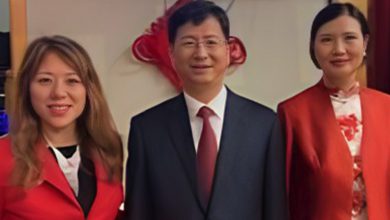City Council Scheduled for Discussion Impacting the Fate of Geoffrey’s Inner Circle

By Amy Cranch
UC Berkeley News
Jade Amor-Shannan Johnson and Cerenity Bush stood under the bright winter sun on Dec. 16, 2023, proudly waiting to process into UC Berkeley’s Haas Pavilion and wearing personalized caps bedecked in glitter, illustrations and motivating phrases.
Johnson’s cap said, “The marathon continues,” and Bush’s quoted Maya Angelou: “Success is loving life and daring to live it.”
The wording suited the two friends, who were among some 1,000 undergraduate and graduate students participating in Winter Commencement 2023. Approximately 6,000 guests cheered as graduates’ names were called.
Johnson had majored in legal studies, with a minor in African American studies. She graduated in three years. Her secret? “I know how to have fun and show up for my studies. I’m happy I worked hard,” she said.
Bush’s major was psychology. As a transfer student from Georgia, she said she’d initially had a hard time finding her place at Berkeley and “felt a heavier weight in getting used to the university, with much less time.” But she prevailed.
Another graduating transfer student, Vanessa Reyes, credited Berkeley for having “broadened my horizons.” As a Mexican American, she grew up in a small town and said she had felt “culture shock coming here.”
Reyes was selected to sing the national anthem at commencement but decided to keep it a surprise for the nearly 30 family members there to honor her. “Graduating from college is a big deal to my family,” she said. “I was taught to be proud of who I am and where I grew up. It’s an honor to sing this song.”
Professor Jennifer Doudna, 2020 winner of the Nobel Prize in Chemistry for her development of CRISPR-Cas9, a genome-engineering technology, gave the keynote address to several rounds of applause. The week before commencement, the federal Food and Drug Administration approved the first-ever therapy using this technology for sickle cell disease, a painful, debilitating blood disorder.
“I’m particularly proud that this therapeutic came from fundamental research here at UC Berkeley,” Doudna said. But, she said, much work remains to make the treatment more widely and globally available. “We can do this by forging the right partnerships,” she said. “And we need to explain our work and invite discussion and debate.”
Comparing the winter graduates’ journey to Homer’s “The Odyssey,” Doudna said, “Like the world of ancient Greece, the world you are entering is dynamic. Embrace it with open arms and a resolute spirit.”
She encouraged students to pursue audacious goals with passion and determination. “But never lose sight of your values, integrity and empathy,” she said. “Success is measured, in large part, by the positive impact you have on others.”
Yael Hacohen held the hands of her 7- and 3-year-old daughters, both wearing tiny graduation robes, when she approached the stage to be hooded for a Ph.D. in rhetoric. A fourth-generation Berkeley graduate and a published poet from Israel, Hacohen said it took a village to get to this day. “I had the best faculty members, who supported every aspect of my writing, every question,” she said.
When asked about juggling her studies and parenthood, Hacohen said, “It matters to be a woman, a mother, and to know that it is possible to achieve anything.”
In her remarks, Chancellor Carol T. Christ acknowledged that political and ideological divides — and, most recently, opposing perspectives about the conflict in the Middle East — are straining the ties that bind the campus community. She encouraged graduates to carry with them Berkeley’s values, including freedom of expression and respectful dialogue.
“I urge you to try to understand views different from your own,” Christ said. “Be skeptical of those who would divide the world into simplistic categories of good and evil, black and white — if only because the reality of our world is often far more complex in its shades of gray.”
Following her address, Christ presented the Elise and Walter A. Haas International Award to Damir Arnaut, who received his undergraduate degree from Berkeley in 1997, his master’s in 1998 and his J.D. in 2002. The award annually honors one of Berkeley’s alumni with a distinguished record of service to another country.
Elected to three terms as a member of Parliament in Bosnia and Herzegovina and recently appointed ambassador to Germany, Arnaut has dedicated his life to strengthening democracy and human rights. He was the first public official to support Bosnia and Herzegovina’s first LGBTQ pride march.
In his remarks, Arnaut said a Berkeley degree gives graduates both humility and audacity. “Berkeley teaches you what is right, provides you the skills to bring it about,” he said, “but also gives you that healthy dose of arrogance that makes you unwavering in your quest.”
Arnaut is currently working to dismantle ethnic divisions that keep individuals like his son — who Arnaut said was born into a “mixed marriage” (Arnaut is Bosnian, and his wife is Croatian) — from holding public office. “I won’t quit in this endeavor. I wouldn’t be worthy of this school, or this award, if I did,” he said.
Graduate Pearleen Wang, who double-majored in data science and music, was chosen to speak as the student representative. She told a story about her mother, who grew up in rural southern Taiwan and poured everything she had into providing a better life for her daughters, including nurturing artistic activities she had not experienced herself. One day, however, she decided to learn the art of cake decorating.
“The more she studied and practiced, the more fantastic her creations became,” said Wang, describing dreamy flower gardens and scenes painted with edible watercolors. “She unlocked an incredible artistic side that had lain dormant since childhood. My family showed me that learning is a lifelong journey, and it’s never too late to discover something new about yourself.”




